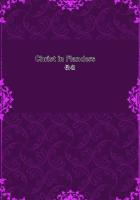With respect to his authorities, and the use he made of their writings, there has been more difference of opinion. Since his narrative covers the same ground as the "Aethiopis" ("Coming of Memnon") and the "Iliupersis" ("Destruction of Troy") of Arctinus (circ. 776 B.C.), and the "Little Iliad" of Lesches (circ. 700 B.C.), it has been assumed that the work of Quintus "is little more than an amplification or remodelling of the works of these two Cyclic Poets." This, however, must needs be pure conjecture, as the only remains of these poets consist of fragments amounting to no more than a very few lines from each, and of the "summaries of contents" made by the grammarian Proclus (circ. 140 A.D.), which, again, we but get at second-hand through the "Bibliotheca" of Photius (ninth century). Now, not merely do the only descriptions of incident that are found in the fragments differ essentially from the corresponding incidents as described by Quintus, but even in the summaries, meagre as they are, we find, as German critics have shown by exhaustive investigation, serious discrepancies enough to justify us in the conclusion that, even if Quintus had the works of the Cyclic poets before him, which is far from certain, his poem was no mere remodelling of theirs, but an independent and practically original work. Not that this conclusion disposes by any means of all difficulties. If Quintus did not follow the Cyclic poets, from what source did he draw his materials? The German critic unhesitatingly answers, "from Homer." As regards language, versification, and general spirit, the matter is beyond controversy; but when we come to consider the incidents of the story, we find deviations from Homer even more serious than any of those from the Cyclic poets. And the strange thing is, that each of these deviations is a manifest detriment to the perfection of his poem; in each of them the writer has missed, or has rejected, a magnificent opportunity.
With regard to the slaying of Achilles by the hand of Apollo only, and not by those of Apollo and Paris, he might have pleaded that Homer himself here speaks with an uncertain voice (cf.
"Iliad" xv. 416-17, xxii. 355-60, and xxi. 277-78). But, in describing the fight for the body of Achilles ("Odyssey" xxiv. 36 sqq.), Homer makes Agamemnon say:
"So we grappled the livelong day, and we had not refrained us then, But Zeus sent a hurricane, stilling the storm of the battle of men."
Now, it is just in describing such natural phenomena, and in blending them with the turmoil of battle, that Quintus is in his element; yet for such a scene he substitutes what is, by comparison, a lame and impotent conclusion. Of that awful cry that rang over the sea heralding the coming of Thetis and the Nymphs to the death-rites of her son, and the panic with which it filled the host, Quintus is silent. Again, Homer ("Odyssey" iv.
274-89) describes how Helen came in the night with Deiphobus, and stood by the Wooden Horse, and called to each of the hidden warriors with the voice of his own wife. This thrilling scene Quintus omits, and substitutes nothing of his own. Later on, he makes Menelaus slay Deiphobus unresisting, "heavy with wine," whereas Homer ("Odyssey" viii. 517-20) makes him offer such a magnificent resistance, that Odysseus and Menelaus together could not kill him without the help of Athena. In fact, we may say that, though there are echoes of the "Iliad" all through the poem, yet, wherever Homer has, in the "Odyssey", given the outline-sketch of an effective scene, Quintus has uniformly neglected to develop it, has sometimes substituted something much weaker -- as though he had not the "Odyssey" before him!
For this we have no satisfactory explanation to offer. He may have set his own judgment above Homer -- a most unlikely hypothesis: he may have been consistently following, in the framework of his story, some original now lost to us: there may be more, and longer, lacunae in the text than any editors have ventured to indicate: but, whatever theory we adopt, it must be based on mere conjecture.
The Greek text here given is that of Koechly (1850) with many of Zimmermann's emendations, which are acknowledged in the notes.
Passages enclosed in square brackets are suggestions of Koechly for supplying the general sense of lacunae. Where he has made no such suggestion, or none that seemed to the editors to be adequate, the lacuna has been indicated by asterisks, though here too a few words have been added in the translation, sufficient to connect the sense.
-- A.S. Way















